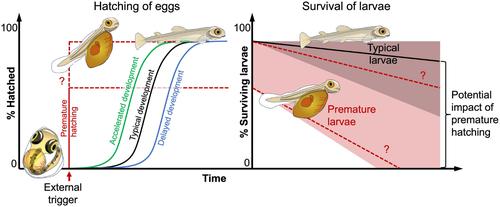当前位置:
X-MOL 学术
›
Glob. Change Biol.
›
论文详情
Our official English website, www.x-mol.net, welcomes your
feedback! (Note: you will need to create a separate account there.)
Global change and premature hatching of aquatic embryos
Global Change Biology ( IF 10.8 ) Pub Date : 2024-09-06 , DOI: 10.1111/gcb.17488 Zara-Louise Cowan 1, 2 , Leon Green 3 , Timothy D Clark 4 , Tamzin A Blewett 5 , Jeremy De Bonville 6 , Thomas Gagnon 6 , Elizabeth Hoots 4 , Luis Kuchenmüller 4 , Robine H J Leeuwis 2 , Joaquín Navajas Acedo 7 , Lauren E Rowsey 8 , Hanna Scheuffele 4 , Michael Richard Skeeles 4 , Lorena Silva-Garay 2 , Fredrik Jutfelt 2, 9 , Sandra A Binning 6
Global Change Biology ( IF 10.8 ) Pub Date : 2024-09-06 , DOI: 10.1111/gcb.17488 Zara-Louise Cowan 1, 2 , Leon Green 3 , Timothy D Clark 4 , Tamzin A Blewett 5 , Jeremy De Bonville 6 , Thomas Gagnon 6 , Elizabeth Hoots 4 , Luis Kuchenmüller 4 , Robine H J Leeuwis 2 , Joaquín Navajas Acedo 7 , Lauren E Rowsey 8 , Hanna Scheuffele 4 , Michael Richard Skeeles 4 , Lorena Silva-Garay 2 , Fredrik Jutfelt 2, 9 , Sandra A Binning 6
Affiliation

|
Anthropogenically induced changes to the natural world are increasingly exposing organisms to stimuli and stress beyond that to which they are adapted. In aquatic systems, it is thought that certain life stages are more vulnerable than others, with embryos being flagged as highly susceptible to environmental stressors. Interestingly, evidence from across a wide range of taxa suggests that aquatic embryos can hatch prematurely, potentially as an adaptive response to external stressors, despite the potential for individual costs linked with underdeveloped behavioural and/or physiological functions. However, surprisingly little research has investigated the prevalence, causes and consequences of premature hatching, and no compilation of the literature exists. Here, we review what is known about premature hatching in aquatic embryos and discuss how this phenomenon is likely to become exacerbated with anthropogenically induced global change. Specifically, we (1) review the mechanisms of hatching, including triggers for premature hatching in experimental and natural systems; (2) discuss the potential implications of premature hatching at different levels of biological organisation from individuals to ecosystems; and (3) outline knowledge gaps and future research directions for understanding the drivers and consequences of premature hatching. We found evidence that aquatic embryos can hatch prematurely in response to a broad range of abiotic (i.e. temperature, oxygen, toxicants, light, pH, salinity) and biotic (i.e. predators, pathogens) stressors. We also provide empirical evidence that premature hatching appears to be a common response to rapid thermal ramping across fish species. We argue that premature hatching represents a fascinating yet untapped area of study, and the phenomenon may provide some additional resilience to aquatic communities in the face of ongoing global change.
中文翻译:

全球变化与水生胚胎过早孵化
人为引起的自然世界变化越来越多地使生物体面临超出其适应范围的刺激和压力。在水生系统中,人们认为某些生命阶段比其他阶段更脆弱,胚胎被标记为高度容易受到环境压力的影响。有趣的是,来自广泛类群的证据表明,水生胚胎可以过早孵化,这可能是对外部压力源的适应性反应,尽管个体成本可能与不发达的行为和/或生理功能有关。然而,令人惊讶的是,很少有研究调查过早孵化的发生率、原因和后果,也没有文献汇编。在这里,我们回顾了对水生胚胎过早孵化的了解,并讨论了这种现象如何可能因人为引起的全球变化而加剧。具体来说,我们(1)回顾孵化机制,包括实验和自然系统中过早孵化的触发因素; (2) 讨论过早孵化对从个体到生态系统的不同生物组织层面的潜在影响; (3) 概述了解过早孵化的驱动因素和后果的知识差距和未来研究方向。我们发现的证据表明,水生胚胎可以响应广泛的非生物(即温度、氧气、毒物、光、pH、盐度)和生物(即捕食者、病原体)应激源而过早孵化。我们还提供了经验证据,表明过早孵化似乎是鱼类对快速升温的常见反应。 我们认为,过早孵化是一个令人着迷但尚未开发的研究领域,这种现象可能为水生生物群落面对持续的全球变化提供一些额外的恢复力。
更新日期:2024-09-06
中文翻译:

全球变化与水生胚胎过早孵化
人为引起的自然世界变化越来越多地使生物体面临超出其适应范围的刺激和压力。在水生系统中,人们认为某些生命阶段比其他阶段更脆弱,胚胎被标记为高度容易受到环境压力的影响。有趣的是,来自广泛类群的证据表明,水生胚胎可以过早孵化,这可能是对外部压力源的适应性反应,尽管个体成本可能与不发达的行为和/或生理功能有关。然而,令人惊讶的是,很少有研究调查过早孵化的发生率、原因和后果,也没有文献汇编。在这里,我们回顾了对水生胚胎过早孵化的了解,并讨论了这种现象如何可能因人为引起的全球变化而加剧。具体来说,我们(1)回顾孵化机制,包括实验和自然系统中过早孵化的触发因素; (2) 讨论过早孵化对从个体到生态系统的不同生物组织层面的潜在影响; (3) 概述了解过早孵化的驱动因素和后果的知识差距和未来研究方向。我们发现的证据表明,水生胚胎可以响应广泛的非生物(即温度、氧气、毒物、光、pH、盐度)和生物(即捕食者、病原体)应激源而过早孵化。我们还提供了经验证据,表明过早孵化似乎是鱼类对快速升温的常见反应。 我们认为,过早孵化是一个令人着迷但尚未开发的研究领域,这种现象可能为水生生物群落面对持续的全球变化提供一些额外的恢复力。































 京公网安备 11010802027423号
京公网安备 11010802027423号